Abstract
Adherence by axenic Entamoeba histolytica trophozoites to mammalian cells is mediated by an N-acetylgalactosamine (GalNAc)-inhibitable adhesin on the surface of the parasite. We isolated 35 hybridoma cell lines producing antibodies to E. histolytica as indicated by ELISA with sonicated amebic protein or by immunofluorescence assay with fixed whole trophozoites. Tissue culture supernatants were further screened for subcloning by the ability to bind to Chinese hamster ovary (CHO) cells which were first exposed to a partially purified soluble preparation of the amebic GalNAc-inhibitable lectin. Eight tissue culture supernatants were positive in this assay. Antibodies from four subcloned cell lines (D3-14, H8-5, I12-2, and I1-21) inhibited amebic adherence to CHO cells (P less than 0.01). Of the original 35 tissue culture supernatants, 3 also inhibited amebic adherence (P less than 0.01; F1, F14, and J10); monoclonal antibodies in these supernatants did not bind to lectin-exposed CHO cells. Three purified monoclonal antibodies (H8-5, I12-2, and I1-21) inhibited amebic adherence at greater than or equal to 2 micrograms/10(4) amebae (P less than 0.05). None of these inhibitory monoclonal antibodies immunoprecipitated with a soluble amebic protein preparation following sodium dodecyl sulfate-polyacrylamide gel electrophoresis under denaturing conditions. Monoclonal antibodies which inhibit in vitro adherence by E. histolytica will be useful in purification of the GalNAc-inhibitable lectin.
Full text
PDF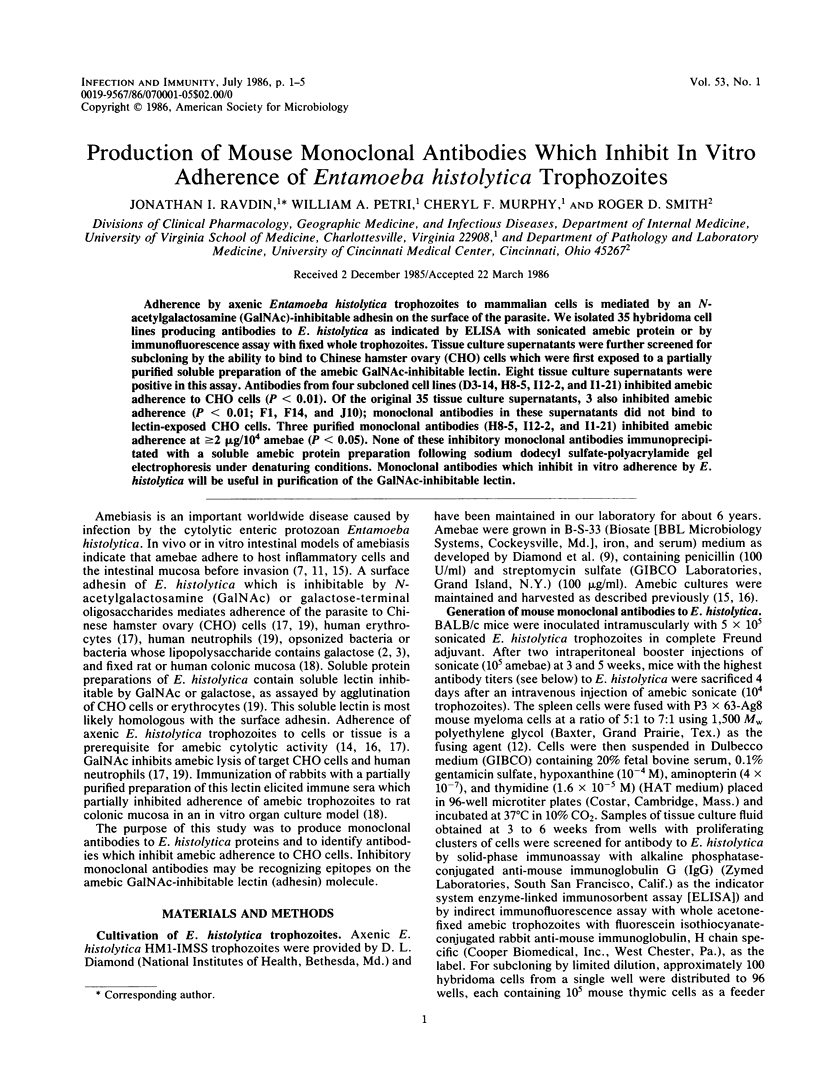
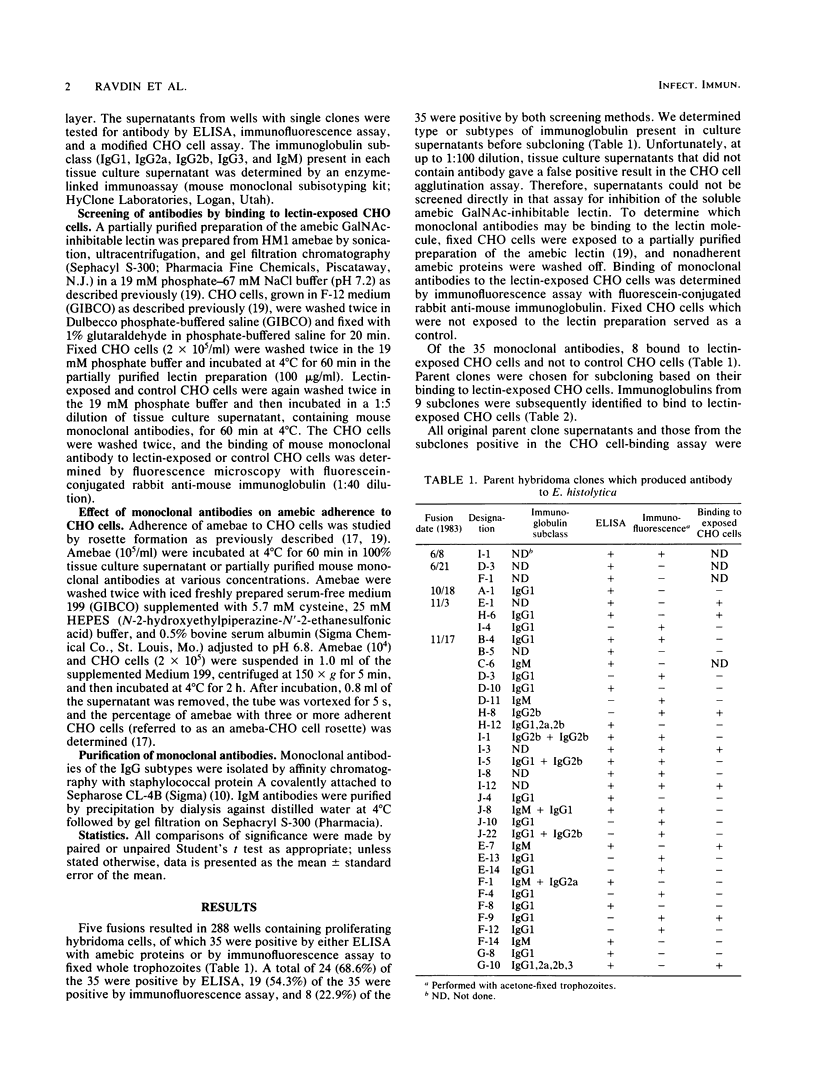
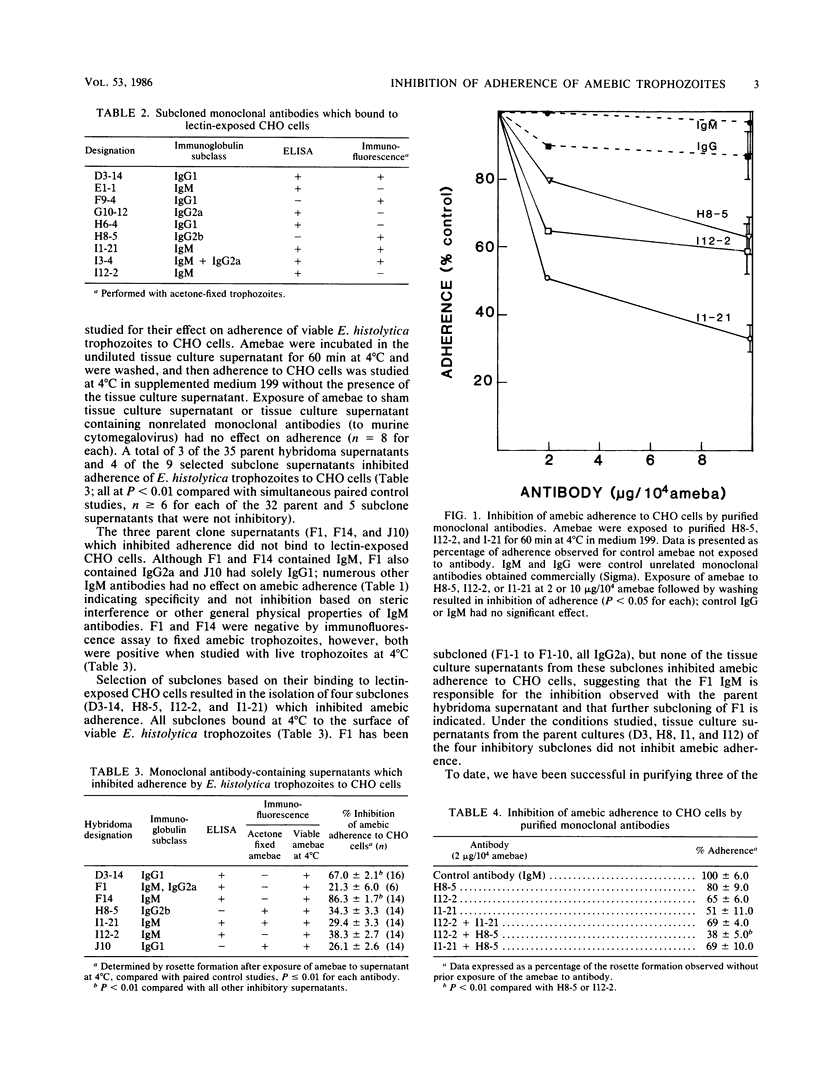
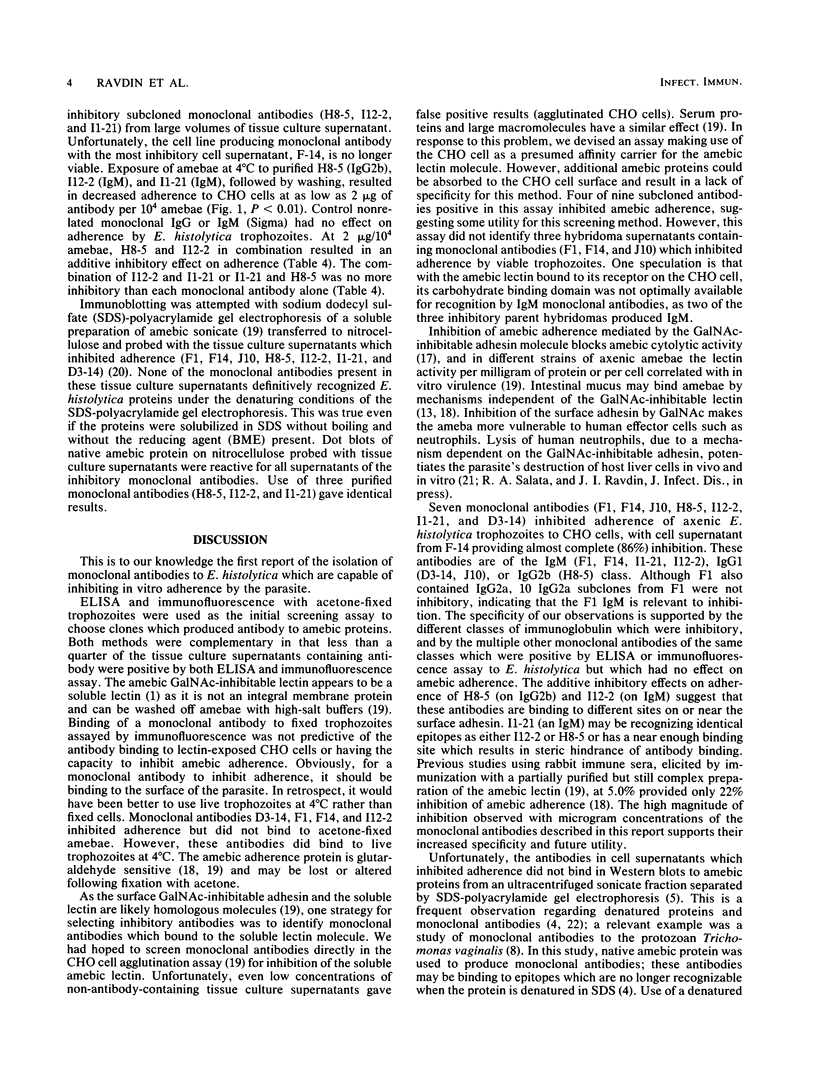
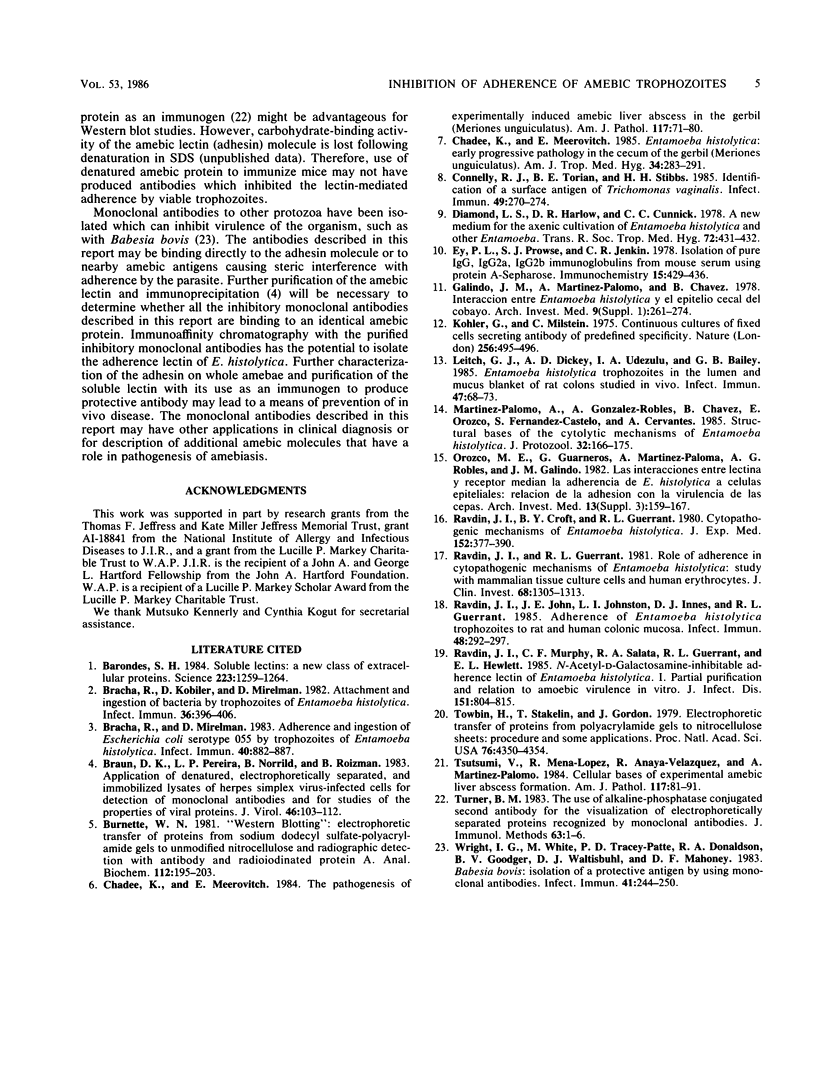
Selected References
These references are in PubMed. This may not be the complete list of references from this article.
- Barondes S. H. Soluble lectins: a new class of extracellular proteins. Science. 1984 Mar 23;223(4642):1259–1264. doi: 10.1126/science.6367039. [DOI] [PubMed] [Google Scholar]
- Bracha R., Kobiler D., Mirelman D. Attachment and ingestion of bacteria by trophozoites of Entamoeba histolytica. Infect Immun. 1982 Apr;36(1):396–406. doi: 10.1128/iai.36.1.396-406.1982. [DOI] [PMC free article] [PubMed] [Google Scholar]
- Bracha R., Mirelman D. Adherence and ingestion of Escherichia coli serotype 055 by trophozoites of Entamoeba histolytica. Infect Immun. 1983 Jun;40(3):882–887. doi: 10.1128/iai.40.3.882-887.1983. [DOI] [PMC free article] [PubMed] [Google Scholar]
- Braun D. K., Pereira L., Norrild B., Roizman B. Application of denatured, electrophoretically separated, and immobilized lysates of herpes simplex virus-infected cells for detection of monoclonal antibodies and for studies of the properties of viral proteins. J Virol. 1983 Apr;46(1):103–112. doi: 10.1128/jvi.46.1.103-112.1983. [DOI] [PMC free article] [PubMed] [Google Scholar]
- Burnette W. N. "Western blotting": electrophoretic transfer of proteins from sodium dodecyl sulfate--polyacrylamide gels to unmodified nitrocellulose and radiographic detection with antibody and radioiodinated protein A. Anal Biochem. 1981 Apr;112(2):195–203. doi: 10.1016/0003-2697(81)90281-5. [DOI] [PubMed] [Google Scholar]
- Chadee K., Meerovitch E. Entamoeba histolytica: early progressive pathology in the cecum of the gerbil (Meriones unguiculatus). Am J Trop Med Hyg. 1985 Mar;34(2):283–291. doi: 10.4269/ajtmh.1985.34.283. [DOI] [PubMed] [Google Scholar]
- Chadee K., Meerovitch E. The pathogenesis of experimentally induced amebic liver abscess in the gerbil (Meriones unguiculatus). Am J Pathol. 1984 Oct;117(1):71–80. [PMC free article] [PubMed] [Google Scholar]
- Connelly R. J., Torian B. E., Stibbs H. H. Identification of a surface antigen of Trichomonas vaginalis. Infect Immun. 1985 Aug;49(2):270–274. doi: 10.1128/iai.49.2.270-274.1985. [DOI] [PMC free article] [PubMed] [Google Scholar]
- Diamond L. S., Harlow D. R., Cunnick C. C. A new medium for the axenic cultivation of Entamoeba histolytica and other Entamoeba. Trans R Soc Trop Med Hyg. 1978;72(4):431–432. doi: 10.1016/0035-9203(78)90144-x. [DOI] [PubMed] [Google Scholar]
- Ey P. L., Prowse S. J., Jenkin C. R. Isolation of pure IgG1, IgG2a and IgG2b immunoglobulins from mouse serum using protein A-sepharose. Immunochemistry. 1978 Jul;15(7):429–436. doi: 10.1016/0161-5890(78)90070-6. [DOI] [PubMed] [Google Scholar]
- Köhler G., Milstein C. Continuous cultures of fused cells secreting antibody of predefined specificity. Nature. 1975 Aug 7;256(5517):495–497. doi: 10.1038/256495a0. [DOI] [PubMed] [Google Scholar]
- Leitch G. J., Dickey A. D., Udezulu I. A., Bailey G. B. Entamoeba histolytica trophozoites in the lumen and mucus blanket of rat colons studied in vivo. Infect Immun. 1985 Jan;47(1):68–73. doi: 10.1128/iai.47.1.68-73.1985. [DOI] [PMC free article] [PubMed] [Google Scholar]
- Martínez-Palomo A., González-Robles A., Chávez B., Orozco E., Fernández-Castelo S., Cervantes A. Structural bases of the cytolytic mechanisms of Entamoeba histolytica. J Protozool. 1985 Feb;32(1):166–175. doi: 10.1111/j.1550-7408.1985.tb03033.x. [DOI] [PubMed] [Google Scholar]
- Mora Galindo J., Martinez-Palomo A., Chavez B. Interacción entre Entamoeba histolytica y el epitelio cecal del cobayo. Arch Invest Med (Mex) 1978;9 (Suppl 1):261–274. [PubMed] [Google Scholar]
- Orozco M. E., Martínez Palomo A., González Robles A., Guarneros G., Galindo J. M. Las interacciones entre lectina y receptor median la adherencia de E. histolytica a células epiteliales. Relación de la adhesión con la virulencia de las cepas. Arch Invest Med (Mex) 1982;13 (Suppl 3):159–167. [PubMed] [Google Scholar]
- Ravdin J. I., Croft B. Y., Guerrant R. L. Cytopathogenic mechanisms of Entamoeba histolytica. J Exp Med. 1980 Aug 1;152(2):377–390. doi: 10.1084/jem.152.2.377. [DOI] [PMC free article] [PubMed] [Google Scholar]
- Ravdin J. I., Guerrant R. L. Role of adherence in cytopathogenic mechanisms of Entamoeba histolytica. Study with mammalian tissue culture cells and human erythrocytes. J Clin Invest. 1981 Nov;68(5):1305–1313. doi: 10.1172/JCI110377. [DOI] [PMC free article] [PubMed] [Google Scholar]
- Ravdin J. I., John J. E., Johnston L. I., Innes D. J., Guerrant R. L. Adherence of Entamoeba histolytica trophozoites to rat and human colonic mucosa. Infect Immun. 1985 May;48(2):292–297. doi: 10.1128/iai.48.2.292-297.1985. [DOI] [PMC free article] [PubMed] [Google Scholar]
- Ravdin J. I., Murphy C. F., Salata R. A., Guerrant R. L., Hewlett E. L. N-Acetyl-D-galactosamine-inhibitable adherence lectin of Entamoeba histolytica. I. Partial purification and relation to amoebic virulence in vitro. J Infect Dis. 1985 May;151(5):804–815. doi: 10.1093/infdis/151.5.804. [DOI] [PubMed] [Google Scholar]
- Towbin H., Staehelin T., Gordon J. Electrophoretic transfer of proteins from polyacrylamide gels to nitrocellulose sheets: procedure and some applications. Proc Natl Acad Sci U S A. 1979 Sep;76(9):4350–4354. doi: 10.1073/pnas.76.9.4350. [DOI] [PMC free article] [PubMed] [Google Scholar]
- Tsutsumi V., Mena-Lopez R., Anaya-Velazquez F., Martinez-Palomo A. Cellular bases of experimental amebic liver abscess formation. Am J Pathol. 1984 Oct;117(1):81–91. [PMC free article] [PubMed] [Google Scholar]
- Turner B. M. The use of alkaline-phosphatase-conjugated second antibody for the visualization of electrophoretically separated proteins recognized by monoclonal antibodies. J Immunol Methods. 1983 Sep 30;63(1):1–6. doi: 10.1016/0022-1759(83)90204-1. [DOI] [PubMed] [Google Scholar]
- Wright I. G., White M., Tracey-Patte P. D., Donaldson R. A., Goodger B. V., Waltisbuhl D. J., Mahoney D. F. Babesia bovis: isolation of a protective antigen by using monoclonal antibodies. Infect Immun. 1983 Jul;41(1):244–250. doi: 10.1128/iai.41.1.244-250.1983. [DOI] [PMC free article] [PubMed] [Google Scholar]


